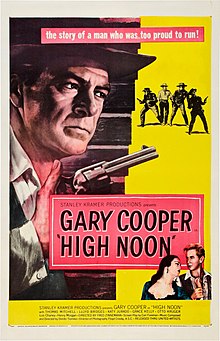
Back High Noon AN ظهيرة مشتعلة (فيلم) Arabic ظهيره مشتعله ARZ قهرمان شریف (فیلم) AZB Точно по пладне Bulgarian Tačno u podne BS Sol davant el perill Catalan V pravé poledne Czech Sheriffen Danish Zwölf Uhr mittags German
| High Noon | |
|---|---|
 Theatrical release poster | |
| Directed by | Fred Zinnemann |
| Screenplay by | Carl Foreman |
| Based on | "The Tin Star" 1947 short story in Collier's by John W. Cunningham |
| Produced by | Stanley Kramer (uncredited) |
| Starring | |
| Cinematography | Floyd Crosby |
| Edited by | Elmo Williams Harry W. Gerstad |
| Music by | Dimitri Tiomkin |
Production company | Stanley Kramer Productions |
| Distributed by | United Artists |
Release date |
|
Running time | 85 minutes |
| Country | United States |
| Language | English |
| Budget | $730,000[1] |
| Box office | $12 million[2] |
High Noon is a 1952 American Western film produced by Stanley Kramer from a screenplay by Carl Foreman, directed by Fred Zinnemann, and starring Gary Cooper. The plot, which occurs in real time, centers on a town marshal whose sense of duty is tested when he must decide to either face a gang of killers alone, or leave town with his new wife.
Though mired in controversy at the time of its release due to its political themes, the film was nominated for seven Academy Awards and won four (Actor, Editing, Score and Song)[3] as well as four Golden Globe Awards (Actor, Supporting Actress, Score, and Black and White Cinematography).[4] The award-winning score was written by Ukraine-born composer Dimitri Tiomkin.
High Noon was selected by the Library of Congress as one of the first 25 films for preservation in the United States National Film Registry for being "culturally, historically, or aesthetically significant" in 1989.[5][6] An iconic film whose story has been partly or completely repeated in later film productions, its ending in particular has inspired numerous later films, including but not just limited to westerns.
- ^ Champlin, C. (October 10, 1966). "Foreman hopes to reverse runaway". Los Angeles Times. ProQuest 155553672.
- ^ Tino Balio, United Artists: The Company That Changed the Film Industry, University of Wisconsin Press, 1987, p. 47.
- ^ "The 25th Academy Awards – 1953". oscars.org. October 4, 2014. Retrieved July 3, 2020.
- ^ IMDB List of nominations and awards for Stanley Kramer's High Noon.
- ^ "ENTERTAINMENT: Film Registry Picks First 25 Movies". Los Angeles Times. September 19, 1989. Retrieved April 22, 2020.
- ^ "Complete National Film Registry Listing". Library of Congress. Retrieved October 30, 2020.